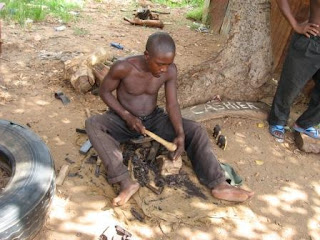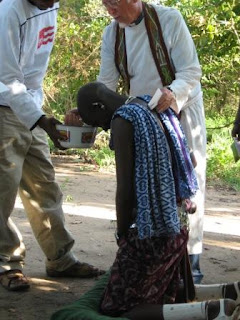Saturday, March 31, 2007
Moving On Soon
I don't know what the internet connection will be like in the new locations I am traveling to, but I will update the blog whenever I can.
Another AMAZING person, Dr. Nkya
.JPG)
A Snake Story
________________________________________________
Translation:
Many things have happened here. Two days ago we saw a poisonous snake. (I am very scared of snakes). Lucio, Narooma, the teacher, and I were studying Swahili [outside] with energy, and Narooma said, "I see a frog." Then she said, "Now I see a snake too. The snake is right behind Christine!" Then the teacher and I ran away from the snake. Other teachers and many people came and beat the snake. After the snake was dead, we returned to studying with effort. (The snake was small and was black and green).
Saturday, March 24, 2007
Men at Work
.JPG) Here is a wood-carver. We went to a wood-carving family and they showed us how they started out with a huge hunk of wood and turned it into a beautiful smooth carving. I bought a couple of things here.
Here is a wood-carver. We went to a wood-carving family and they showed us how they started out with a huge hunk of wood and turned it into a beautiful smooth carving. I bought a couple of things here. Friday, March 16, 2007
Two 'Firsts'
Today was an interesting and exciting day. Perhaps one of the most interesting since I have arrived in Tanzania. It was a day where I experienced 2 things for the first time: 1) It was the first time I was in a vehicle got stuck in the mud on a bad road and 2) It was the first time I have witnessed a person being possessed.
A couple of days ago Pastor Hofferman invited Karleen and I to go with him to a new preaching place. Two Tanzanians went with us as well. During the drive Pastor Hofferman gave us some background on both the history of the relationship between the Christians and the Maasai as well as the background the village we are going to. Over the last several decades a Christian group Hofferman calls the 'Pentecostals' tried to convert the Maasai. They came in and told the Maasai that they were all going to Hell and that they need to stop wearing traditional clothes and start wearing European clothes, that the women couldn't wear beads or earrings, that the Maasai men should divorce their additional wives, that they had to stop their nomadic lifestyle and give up their cows because according to the Pentecostals "God doesn't like people with too many cows." Well, you can imagine how well that went over. It resulted in a lot of negative sentiment towards the Christians among the Maasai.
Pastor Hofferman started working as the pastor for this region in 1993. Pastor Hofferman has a completly different approach to interacting with the Maasai (and all people for that manner) than the Pentecostal groups. He has a gentle and kind personality and he respects the Maasai as equals. He also respects their culture and traditions and acts as their advocate. Because of their nomadic lifestyle, the Maasai do not have as much access to education and social services as the Swahili populations. Often the Maasai are discriminated against in the court (when a farmer wants the Maasai's grazing land). They are also frequently refused medical care because they are looked down on as 'backwards' by some of the educated parts of society. Pastor Hofferman tries to make sure the Maasai get fair treatment in the courts and he has gone to great extents to make sure that they get access to medical care. The result is that the Maasai respect and love Pastor Hofferman and respond to his message. In 1993 when he became pastor for the region, there were about 1,000 members in the church, not there are over 10,000. There are 95 churches spread out in the area and each has a Tanzanian lay pastor who has attended 2 years of Bible school that hold weekly services. Hover, they can't perform weddings, baptisms or marriages.
The head of the village that we were traveling towrads had some very negative experiences with the Pentecostal Christians and had even chased them away when they had tried to come to his village. By “village” I mean one huge family: the head man, his wives, the head man's younger brothers and their wives, countless children and in-laws. However, recently this man had a change of heart. Several weeks ago when we were at the Maasai cattle market he came up to Pastor Hofferman and asked if he would come to his house and baptism his family. The next time we were at the cattle market the man came and asked the same thing. The last time we were at the cattle market he sent a messenger to find us and tell us that he had even started to build a church for his village and that he wanted a lay pastor to be assigned to him as well.
Back to driving... on our 3 hour drive to this location we went over a muddy spot in the "road" and we got stuck in the mud. It only took 1/2 an hour and two men pushing on the car to get us out, so I have been told this actually wasn't too bad of a 'getting stuck' experience.
When we arrived we were greeted by the whole family and served tea. Then the head man took us out to see his cattle. You can see his hand in the above picture. I told him in Swahili that his cows were very nice and he said that I must be a true Maasai at heart if I could appreciate good cows.
.JPG)
This is the head man of the village. He was actually very young. He was also very happy. He smiled the whole day and kept telling us how happy he was that we had come.
After we had been there for a while I asked if it would be OK if took some pictures. The Maasai men really liked my digital camera and pretty soon they were taking all sorts of blurry pictures and laughing at the images of themselves. (I had over 100 pictures taken on my camera that day). It was really fun.
.JPG)
Here Karleen and I are sitting with the men in white plastic lawn chairs (yes, Andy you are right - plastic lawn chairs really are everywhere). We were 'honorary men' for the day (usually women sit on mats on the ground away from the men) and so most or our conversations were with the men. I wanted to go sit with the women for a while, but Pastor Hofferman told me that would be very rude as it would be seen as refusing their hospitality and the honor we had been given.
.JPG)
The baptism registration took so long that the church service didn't start until 3 in the afternoon. We had the service under a huge tree. Here one of the Maasai men is getting baptized.
.JPG)
The women werebaptiized after the men. This was one of the first women to be baptized. All the baptisms were going along normally until it was the second to the last woman. She was a very nice looking woman of about 20 who had a baby tied on her back. She came forward and kneeled down on the little cushion. However, when Pastor Hofferman touched her head she started to scream and thrash around violently. One of the other wives ran forward and grabbed the baby before it fell. The woman continued to scream and then she started to growl and make really strange noises that didn't sound like her voice at all. She was crawling around on the ground and moving almost like a dog. A lay pastor and some of the wives went to her and started praying for her and holding her down. Pastor Hofferman finished the last baptism and then went over to the woman. He joined the other people praying for her and some of the other wives were holding her down (it took about 6 people) so she wouldn't injure herself. After about 1/2 an hour of praying and singing, she calmed down and her growling and screaming turned into crying. The head man's mother told Pastor Hofferman that the woman had said in Kimaasai that she wanted him to continue with the baptism. After they baptized her she became completely calm and she took communion with everyone else.
.JPG)
A picture of the Maasai wives taking communion. When I asked Pastor Hofferman to explain what happened, he said that the woman had been possessed by an evil spirit. He said that the woman came from a family that practiced sorcery and that she had been given the evil spirit by a witch doctor. (Important note, witch doctor does not equal tradtional healer who uses herbs and natural remedies to cure illnesses). He said that women usually go to a witch doctor when something bad happens such as a sick child or an inability to get pregnant with the hopes that he can cure the problem. The witch doctor will write some verses on a piece of paper and then put the paper in a jar of water. The witch doctor then makes the person drink the water while performing some sort-of sacrifice and the spirit will then inhabit the individual. Pastor Hofferman said this is very hard to believe for many people in the US and Europe because they don't think sort-of things exist, but here in Africa they are part of everyday life.
Monday, March 12, 2007
"I've got antelope liver stuck between my teeth"
.JPG) We drove for at least 2 hours to get there. Here is picture our the windshield of the car. The road here was unusually smooth and flat. I tried to take some pictures where the road was bad, but the pictures are so blurry you can't see anything. It is common to see people walking or biking at the side of the road. As you can see, it is very green at this time of year.
We drove for at least 2 hours to get there. Here is picture our the windshield of the car. The road here was unusually smooth and flat. I tried to take some pictures where the road was bad, but the pictures are so blurry you can't see anything. It is common to see people walking or biking at the side of the road. As you can see, it is very green at this time of year..JPG)
After we parked the car we had a 10 minute hike to get to the church. The above picture shows us walking to the church. The church is the little building to the left of the picture. Pastor Hofferman is the white man in the blue shirt.
After the offering we are invited back into the church and they give us each a huge pile or rice with another piece of meat perched on the top. This time I got part of the antelope's vertebral column. I am pretty sure it was from the lumbar section, but I wasn't completely sure.
Sunday, March 11, 2007
The Children's Home
.JPG)
Monday, March 5, 2007
Maasai Market Again
.JPG)
Here I am with a woman after I had purchased several pieces of fabric from her. We only had to write one number in the dirt during our bargaining process. In addition to the fabric I also purchased a handmade Maasai knife with a goat skin sheath for about $2.50.
This is a Maasai man who was witnessing our bargaining process. Unfortunately, you can't see his teeth in the picture. Since the Maasai work with animals I guess they are prone to tetanus (or so I am told) so when a child reaches about 6 years old, they knock out the two bottom front teeth so that if the child gets tetanus and the resulting lockjaw he/she can be fed through a straw. ( I commented that is sounds like the Maasai would be a good market for the tetanus vaccine as getting a shot every 10 years sounds a lot more pleasant that getting adult teeth pulled without anesthetic. However, I was told that it has now become a deep set tradition to knock out the front teeth and they usually do it even if there is no risk of tetanus).
.JPG)
.JPG)
.JPG)
.JPG)
.JPG)
.JPG)
.JPG)
.JPG)
.JPG)




